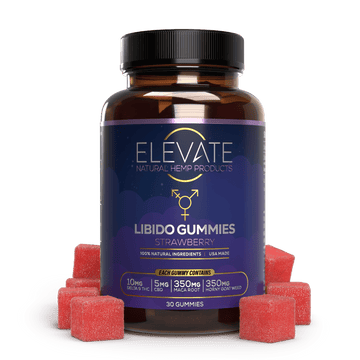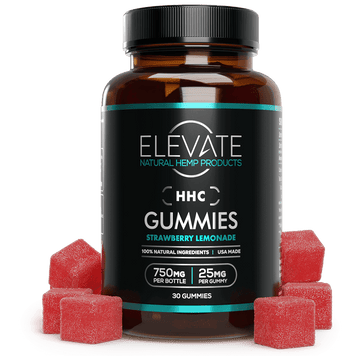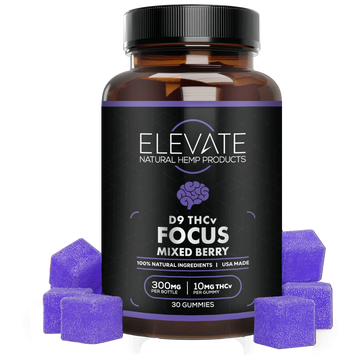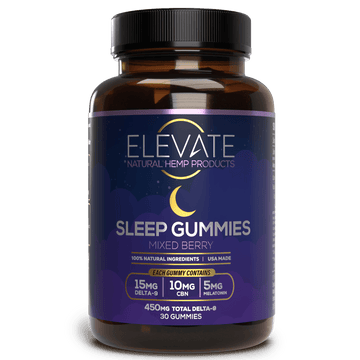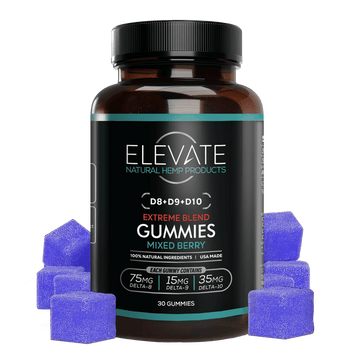As the cannabis industry continues to innovate and expand, enthusiasts and newcomers alike are presented with an array of compounds, each offering unique experiences and benefits. Today, we’re focusing on Hexahydrocannabinol (HHC) and comparing it to the potent THC-O, shedding light on their distinct characteristics, effects, and why they might be worth your attention.
Whether you’re seeking a new kind of euphoria, pain relief, or simply curious about what lies beyond the well-trodden path of THC and CBD, this blog is your guide to understanding the complex, intriguing world of HHC and THC-O.
What is HHC?
HHC, or Hexahydrocannabinol, is a newcomer on the block of cannabinoids that’s been capturing the attention of cannabis enthusiasts and researchers alike. Unlike its more famous relatives, THC and CBD, HHC is not directly derived from the cannabis plant. Instead, it’s a hydrogenated form of THC, similar in the way margarine is made from vegetable oil. This slight molecular tweak makes HHC stand out in the cannabinoid family for several reasons, including its legal status in areas where traditional THC products might still be under tight restrictions.
How is HHC Made?
The production of HHC is a bit like a science experiment that you might not have paid attention to in high school chemistry class. It starts with THC, which undergoes a process called hydrogenation. In this process, hydrogen molecules are added to THC’s chemical structure under high pressure and in the presence of a catalyst, typically a metal like palladium or nickel.
This doesn’t just slightly alter THC’s molecular makeup; it fundamentally changes its pharmacological properties. The result is HHC, a compound that’s more stable and resistant to oxidation and UV light, meaning it has a longer shelf life than THC. This stability is a significant advantage for manufacturers and consumers looking for a more durable product.
Its Semi-Synthetic Origin
One of the most fascinating aspects of HHC is its semi-synthetic origin. This doesn't mean it's entirely lab-made; instead, it starts as a natural cannabinoid, typically THC from hemp. Scientists then use a process called hydrogenation—the same method that turns vegetable oil into margarine—to add hydrogen atoms to the THC molecule. This process fundamentally alters its chemical structure, creating a new compound with distinct properties. It’s this clever bit of chemistry that makes HHC a unique player in the world of cannabinoids, setting it apart from compounds found naturally in the plant.
So, what's the point of this transformation? The primary benefit is enhanced stability. The resulting HHC molecule is much more resistant to degradation from heat and UV light, giving it a longer shelf life than its THC counterpart. This increased durability means you can be confident that the product maintains its potency over time. For anyone seeking a reliable and consistent effect, this stability makes products like HHC gummies a fantastic option, delivering the experience you expect, every time you reach for them.
Effects of HHC Cannabinoid
When it comes to the effects of HHC, users report a range of experiences that bear a resemblance to those of traditional THC, but with a few twists. Much like THC, HHC interacts with the body’s endocannabinoid system, but not in the exact same way. Users often report feelings of euphoria, relaxation, and altered perception, which are characteristic of THC. However, HHC is also noted for its slightly more pronounced analgesic, or pain-relieving, properties.
An interesting aspect of HHC is its potency, which seems to sit somewhere between Delta-8 and Delta-9 THC. This makes it a fascinating option for those who find Delta-9 THC too intense or are looking for something stronger than Delta-8. Its legal status, derived from hemp and not directly from marijuana, adds to its appeal, making it accessible in many places where THC is still banned.
However, it’s important to approach HHC with the same caution as any other cannabinoid. The effects can vary widely depending on the individual, dosage, and method of consumption. As with any cannabis product, starting low and going slow is wise until you understand how HHC affects you personally.
Potential for Mental Clarity
One of the most talked-about benefits of HHC is its potential for a more clear-headed experience. While it provides a pleasant, uplifting feeling similar to Delta-9 THC, many users find it less intense. People often describe the high as more relaxing, allowing for mental clarity without the anxiety or paranoia that can sometimes accompany stronger cannabinoids. This means you might find it easier to stay focused on tasks or enjoy social situations without feeling overwhelmed. Unlike the sometimes foggy feeling from traditional THC, HHC can offer a sense of calm that still lets you function. If you're looking for a cannabinoid that helps you unwind while keeping your mind sharp, HHC gummies could be an excellent choice to explore. This unique effect makes it a popular option for daytime use or for those who are more sensitive to the potent effects of Delta-9.
What is THC-O?
THC-O, or THC-O acetate, is often described as the “psychedelic” cousin of THC, the most well-known psychoactive component of cannabis. This intriguing compound has been making waves in the cannabinoid community for its unique properties and potent effects. Unlike the more familiar THC, THC-O is not a naturally occurring cannabinoid in the cannabis plant. Instead, it’s a synthetic derivative that’s created through a series of chemical reactions, which might sound a bit intimidating at first. But don’t worry, we’re here to break it down for you in a way that’s easy to digest and understand.
How is THC-O Made?
The creation of THC-O acetate is a process that would pique the interest of any chemistry enthusiast. It begins with the extraction of THC from cannabis plants, which is then subjected to a reaction with acetic anhydride. This chemical is pretty powerful and not something you’d find in your everyday kitchen.
The reaction essentially adds an acetate group to the THC molecule, transforming it into THC-O acetate. This chemical process not only alters the molecular structure of THC but also its potency and the way it interacts with the body. It’s a complex procedure that requires expertise and precise conditions, which means it’s not something to try at home.
A Fully Synthetic Cannabinoid
What really sets THC-O apart is that you won’t find it naturally in the cannabis plant. While cannabinoids like CBD and Delta-9 THC are extracted directly from hemp, THC-O is entirely lab-created. It’s what’s known as a synthetic analog, meaning it’s a molecule that has been structurally altered from its original form. This transformation is what gives THC-O its reputation for being significantly more potent than traditional THC, with some users describing its effects as more spiritual or introspective. Because it’s synthesized, its properties are distinct from other compounds you might be familiar with, like those found in our HHC gummies, which undergo a different process to achieve their unique effects.
The Manufacturing Process
The creation of THC-O is a complex chemical process best left to professionals in a controlled lab setting. The journey typically begins with CBD extracted from hemp, which is then converted into Delta-8 THC. The crucial step involves introducing a chemical called acetic anhydride to the Delta-8 THC molecules. This reaction adds an acetate group, transforming the molecule into THC-O acetate. This structural change is key, as it makes the compound more bioavailable, allowing your body to absorb it more effectively. This increased bioavailability is why THC-O has a delayed onset but delivers much more potent effects than many other cannabinoids you can shop for.
Effects of THC-O Cannabinoid
Now, let’s talk about the effects of THC-O, which is where things really get interesting. THC-O is known for its potent psychoactive effects, which are significantly stronger than those of traditional THC. Users often describe the experience as more spiritual or psychedelic, with a depth of introspection and altered perception that goes beyond what you might expect from cannabis. This has led to THC-O being dubbed “the psychedelic cannabinoid,” a title that certainly captures the imagination.
The onset of THC-O’s effects can be slower than other cannabinoids, sometimes taking up to an hour to fully manifest. However, when they do, users report a range of experiences from profound euphoria and visual enhancements to deep philosophical insights and a heightened sense of connectivity with the universe. It’s this intensity and depth of experience that sets THC-O apart from its synthetic cannabinoid cousins.
Despite its potency, THC-O also shares some of the therapeutic benefits associated with cannabis, such as pain relief, anti-nausea effects, and appetite stimulation. However, due to its strength, it’s crucial for users to approach THC-O with caution, especially those new to cannabis or with lower tolerance levels.
Comparing THC-O to other cannabinoids, it’s clear that it occupies a unique space within the spectrum of cannabis experiences. Its synthetic nature and potent effects make it a subject of curiosity and caution within the cannabis community. As with any potent substance, the key to a positive experience with THC-O lies in responsible use, starting with low doses and gradually working your way up as you become familiar with this hemp plant and its effects.
Delayed Onset as a Prodrug
One of the most important things to know about THC-O is its delayed onset. Unlike other cannabinoids that get to work relatively quickly, THC-O is a prodrug, meaning it’s inactive when you first take it. Your body needs to process it first. Essentially, your liver metabolizes the compound, removing the acetate molecule and converting it into the familiar and potent Delta-9 THC. Only then can it interact with your body's endocannabinoid system. This extra step is why you could be waiting up to an hour or more to feel anything. Understanding this unique timeline is crucial for a safe and positive experience, so patience is definitely a virtue with THC-O.
Is HHC Stronger Than THC-O?
To cut to the chase, HHC is generally not considered stronger than THC-O. While both cannabinoids are derivatives of THC, THC-O is known for its heightened potency, often cited as being several times stronger than Delta-9 THC, the primary psychoactive component in cannabis. HHC, on the other hand, offers a more moderate experience. It’s closer in strength to Delta-9 THC, sometimes slightly less potent, depending on its molecular configuration and the user’s tolerance.
THC-O’s potency is largely due to its chemical structure, which allows it to cross the blood-brain barrier more efficiently once it’s metabolized by the body. This efficiency leads to more intense psychoactive effects. Users often report a more profound, sometimes psychedelic experience with THC-O compared to the more familiar and milder euphoria associated with HHC.
What’s the Difference Between HHC and THC-O?
The primary difference between HHC and THC-O lies in their chemical structures and the way they’re produced. HHC is a hydrogenated form of THC, created by adding hydrogen molecules to THC’s structure, which alters its physical and chemical properties, increasing its stability and shelf-life. THC-O, however, is an acetate ester of THC, produced through a chemical reaction that introduces an acetic anhydride into THC, significantly amplifying its potency.
These structural differences not only affect their strength but also their legality, stability, and how they interact with the body’s endocannabinoid system. HHC is noted for its legal gray area in many regions due to its hemp derivation and the absence of THC in its final form, making it more accessible. THC-O’s legal status is more precarious, often categorized alongside other synthetic cannabinoids, which can limit its availability.
Shelf Life and Stability
When you're choosing between cannabinoid products, thinking about how long they'll last is a practical consideration. This is an area where HHC, or Hexahydrocannabinol, truly stands out due to its impressive stability. Through a process called hydrogenation, its chemical structure is fortified, making it more resistant to degradation from things like oxidation and UV light. This means HHC has a significantly longer shelf life than traditional THC, often remaining potent for two years or more. For anyone who likes to stock up or doesn't use their products daily, this durability is a huge advantage, ensuring a consistent and reliable experience every time.
On the other hand, THC-O doesn't share the same resilience. Its chemical structure as an acetate ester is less stable, giving it a shorter shelf life of about a year, during which it can gradually lose some of its strength. This means the effects might become less predictable over time. If longevity is a key factor for you, HHC is the more dependable option. When you decide to purchase HHC gummies, you can feel confident that they will maintain their quality, ready for you to enjoy whenever you are.
HHC vs. THC-O Potency
When discussing the potency of HHC versus THC-O, it’s essential to consider not just the psychoactive intensity but also the effects each cannabinoid can have on the body and mind. THC-O’s enhanced potency means that its effects can be more profound and longer-lasting, with users reporting deeply introspective and sometimes visionary experiences. Its potent nature makes dosage particularly important, with a strong emphasis on starting low and going slow, especially for those new to THC-O.
HHC, while offering a more subdued experience relative to THC-O, still provides a significant psychoactive effect, with the added benefit of being less likely to induce anxiety or discomfort in those with lower tolerance levels. Its effects are often described as a middle ground between Delta-8 and Delta-9 THC, offering a balanced experience that combines euphoria, relaxation, and pain relief without the overwhelming intensity associated with stronger cannabinoids.
THC-O: Roughly 300% More Potent Than Delta-9 THC
When you hear that THC-O is potent, it’s not an exaggeration. This compound is estimated to be about three times, or 300%, stronger than conventional Delta-9 THC. This significant jump in strength is why it’s often called "the psychedelic cannabinoid." Because of its intensity, THC-O is definitely not recommended for those new to cannabis. The experience can be profoundly introspective and much more powerful than what you might expect from other cannabinoids. A very small dose can produce strong effects, so anyone curious about THC-O should approach it with extreme caution and a deep understanding of their own tolerance levels. It’s a completely different ballpark compared to more common cannabinoids.
HHC: About 70-80% as Strong as Delta-9 THC
If THC-O represents the high end of the potency spectrum, HHC offers a much more manageable and balanced experience. HHC is generally considered to be about 70-80% as potent as Delta-9 THC, placing it in a comfortable middle ground. It’s noticeably stronger than Delta-8 but typically less intense than Delta-9, making it a fantastic option for those seeking a clear-headed, functional high without the potential for anxiety that can sometimes accompany stronger compounds. Many users describe the feeling as relaxing and euphoric, perfect for unwinding or enjoying social situations. For a reliable and enjoyable way to explore this cannabinoid, products like HHC gummies provide a consistent dose and a great taste.
How to Consume HHC and THC-O
Starting with HHC (Hexahydrocannabinol), this cannabinoid is known for its similarity to THC but with a legal status that makes it more accessible in many places. HHC can be consumed in several ways, including HHC vape carts, tinctures, edibles, and more. Vaping HHC offers a quick onset of effects, while edibles provide a longer-lasting experience but take longer to kick in. The choice depends on your preference for convenience, duration, and intensity of effects.
THC-O, on the other hand, is a bit of a different beast. Its potency is something to be mindful of. THC-O is also available in vape cartridges, tinctures, and edibles. Due to its strength, starting with a very low dose, especially if you’re new to THC-O, is crucial. The effects can be delayed, particularly with edibles, so patience is key.
Legality of HHC & THC-O
The legality of both HHC and THC-O exists in a bit of a gray area, largely due to the ever-changing landscape of cannabis laws and the nuances of the 2018 Farm Bill in the United States. Generally, HHC and THC-O are considered legal at the federal level since they can be derived from hemp, which is federally legal under the Farm Bill. However, state laws can vary greatly, so it’s essential to check the specific regulations in your area.
The DEA's Ruling on THC-O
The legal status of THC-O took a significant turn in early 2023. The U.S. Drug Enforcement Administration (DEA) clarified its position, stating that THC-O does not qualify as legal hemp. According to the DEA, because THC-O is a synthetic cannabinoid that doesn't occur naturally in the hemp plant, it is considered a controlled substance under federal law. This ruling effectively separates THC-O from other hemp-derived cannabinoids like Delta-8 or HHC, placing it in a much riskier legal category for both sellers and consumers across the country.
State-by-State HHC Bans and Restrictions
Unlike THC-O, HHC generally falls under the protection of the 2018 Farm Bill at the federal level, making it legal to produce and sell as long as it's derived from hemp. However, the legality of HHC gets complicated at the state level. Many states have created their own laws to regulate or ban hemp-derived cannabinoids. As a result, HHC is explicitly banned or restricted in over a dozen states, including New York, Arizona, and Alaska. This means that while you can easily find products like HHC gummies online, it's your responsibility to confirm they are legal to purchase and possess in your specific location.
Lack of FDA Oversight
It's important to understand that the Food and Drug Administration (FDA) does not currently regulate hemp-derived products like HHC. This lack of federal oversight creates a "buyer beware" market where the quality, purity, and potency of products can vary dramatically from one brand to another. Without FDA guidelines, companies are not required to test their products for contaminants like heavy metals, pesticides, or residual solvents. This makes it absolutely essential for you to do your own research and choose brands that are transparent and committed to safety, which we'll cover more in the next section.
Safety and Consumer Warnings
Exploring new cannabinoids can be exciting, but your safety should always come first. Because the market is largely unregulated, the responsibility falls on you to be a smart and informed consumer. This means understanding potential risks, knowing what to look for in a quality product, and using these compounds responsibly. From drug testing implications to the importance of lab reports, being aware of these factors will help you have a safer and more positive experience. Let's go over some of the most important safety considerations you should keep in mind before trying HHC or other novel cannabinoids.
Risk of Failing a Drug Test
If you are subject to drug testing for any reason, you should avoid both HHC and THC-O. Standard drug tests are designed to detect metabolites of THC, not to distinguish between different types of THC or their analogs. Because HHC and THC-O have chemical structures similar to Delta-9 THC, your body breaks them down into similar byproducts. This means that using either of these cannabinoids will very likely result in a positive test for THC. There is no reliable way to clear these compounds from your system quickly, so the only way to ensure you pass a drug test is to abstain completely.
The Importance of Third-Party Lab Testing
In an unregulated industry, third-party lab testing is the single most important indicator of a product's safety and quality. Reputable companies send samples of their products to independent labs to verify their potency and check for harmful contaminants. These lab reports, often called Certificates of Analysis (COAs), should be easily accessible on the company's website. A COA will confirm the amount of HHC or other cannabinoids in the product and show that it's free from things like pesticides, heavy metals, and solvents. If a brand doesn't provide up-to-date lab results, you should not purchase their products.
Unknown Long-Term Health Effects
HHC and THC-O are relatively new to the market, which means there is very little scientific research on their long-term health effects. Most of what we know about their impact comes from anecdotal user reports rather than controlled clinical studies. While many people use these cannabinoids without issue, the absence of long-term data is a risk to consider. This uncertainty makes it even more important to start with a low dose and pay close attention to how your body responds. Being cautious allows you to gauge your personal tolerance and minimize potential unknown risks.
What Happens If You Take Too Much?
Just like with traditional THC, consuming too much HHC or THC-O can lead to an uncomfortable experience. The side effects of overconsumption are similar and can include feelings of intense anxiety, paranoia, dizziness, nausea, and confusion. Since THC-O is significantly more potent than HHC and even Delta-9 THC, the risk of having a negative reaction is higher if you aren't careful with your dosage. Always follow the "start low and go slow" rule. Begin with the smallest possible dose, wait at least an hour or two to see how you feel, and only then consider taking more.
Avoiding Mixing with Alcohol or Other Drugs
Mixing cannabinoids like HHC with alcohol or other substances is not recommended. Combining them can amplify the effects of both, often in unpredictable and unpleasant ways. For example, mixing HHC with alcohol can significantly increase feelings of dizziness, nausea, and impairment, which can be dangerous. To ensure a safe and predictable experience, it's best to consume HHC on its own, especially when you are still learning how it affects you. This allows you to fully understand its unique effects without interference from other substances, leading to a more controlled and enjoyable outcome.
Is HHC or THC-O Better?
Asking whether HHC or THC-O is better is like asking if chocolate or vanilla is the superior ice cream flavor—it really comes down to personal preference and what you’re looking to get out of your cannabinoid experience.
HHC offers a more familiar, THC-like high, with the added bonus of cannabis products being more legally accessible and having a longer shelf life. It’s a great option for those looking for something close to traditional cannabis experiences without stepping too far outside legal boundaries.
THC-O, with its potent, almost psychedelic effects, is for the more adventurous souls or those seeking profound introspective experiences. It’s also worth considering for individuals with higher tolerance levels looking for something more potent than what they’re used to


